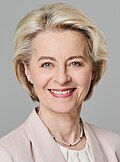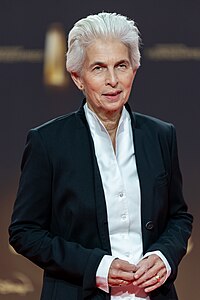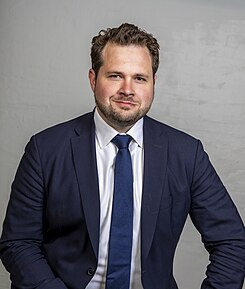
The European Parliament (EP) is one of the legislative bodies of the European Union and one of its seven institutions. Together with the Council of the European Union, it adopts European legislation, following a proposal by the European Commission. The Parliament is composed of 705 members (MEPs), due to rise to 720 after the June 2024 European elections. It represents the second-largest democratic electorate in the world, with an electorate of 375 million eligible voters in 2009.

The European People's Party Group is a centre-right political group of the European Parliament consisting of deputies (MEPs) from the member parties of the European People's Party (EPP). Sometimes it also includes independent MEPs and/or deputies from unaffiliated national parties. The EPP Group comprises politicians of Christian-democratic, conservative and liberal-conservative orientation.

The president of the European Commission is the head of the European Commission, the executive branch of the European Union (EU). The president of the Commission leads a cabinet of Commissioners, referred to as the College. The president is empowered to allocate portfolios among, reshuffle, or dismiss Commissioners as necessary. The College directs the commission's civil service, sets the policy agenda and determines the legislative proposals it produces. The commission is the only body that can propose or draft bills to become EU laws.

Jean-Claude Juncker is a Luxembourgish politician who was the 23rd prime minister of Luxembourg from 1995 to 2013 and 12th president of the European Commission from 2014 to 2019. He also was Finance Minister from 1989 to 2009 and President of the Eurogroup from 2005 to 2013.

The president of the European Parliament presides over the debates and activities of the European Parliament. They also represent the Parliament within the European Union (EU) and internationally. The president's signature is required for laws initiated under co-decision and the EU budget.

Daniel Caspary is a German politician who has been serving as a Member of the European Parliament (MEP) since 2004. He is a member of the Christian Democratic Union (CDU), part of the European People's Party (EPP). Daniel Caspary is now in the fourth legislature of the European Parliament. Daniel Caspary lives in Weingarten. He is married and has five children.

The apportionment of seats within the European Parliament to each member state of the European Union is set out by the EU treaties. According to European Union treaties, the distribution of seats is "degressively proportional" to the population of the member states, with negotiations and agreements between member states playing a role. Thus the allocation of seats is not strictly proportional to the size of a state's population, nor does it reflect any other automatically triggered or fixed mathematical formula. The process can be compared to the composition of the electoral college used to elect the President of the United States of America in that, pro rata, the smaller state received more places in the electoral college than the more populous states.

Manfred Weber is a German politician who has served as President of the European People's Party (EPP) since 2022 and as Leader of the EPP Group in the European Parliament since 2014. He has been a Member of the European Parliament (MEP) from Germany since 2004. He is a member of the Christian Social Union in Bavaria (CSU), part of the European People's Party.
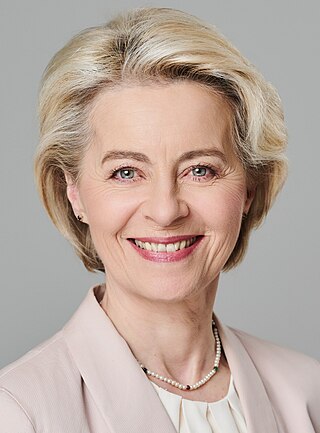
Ursula Gertrud von der Leyen is a German physician and politician serving as the 13th president of the European Commission since 2019. She served in the German federal government between 2005 and 2019, holding successive positions in Angela Merkel's cabinet, most recently as federal minister of defence. Von der Leyen is a member of the centre-right Christian Democratic Union (CDU) and its affiliated europarty, the European People's Party (EPP). On 7 March 2024, the EPP elected her as its Spitzenkandidat to lead the campaign for the 2024 European parliament elections.

The 2009 European Parliament election was held in the 27 member states of the European Union (EU) between 4 and 7 June 2009. A total of 736 Members of the European Parliament (MEPs) were elected to represent some 500 million Europeans, making these the biggest trans-national elections in history. An additional 18 observers were pre-elected.

The European Conservatives and Reformists (ECR) is a soft Eurosceptic, anti-federalist political group of the European Parliament. The ECR is the parliamentary group of the European Conservatives and Reformists Party European political party (formerly known as the Alliance of Conservatives and Reformists in Europe or Alliance of European Conservatives and Reformists, but also includes MEPs from four other European parties and thirteen MEPs without European party affiliation.

The 2014 European Parliament election was held in the European Union, from 22 to 25 May 2014.

Franziska Maria "Ska" Keller is a German politician and member of the European Parliament for the Germany constituency. She is a member of the Alliance 90/The Greens, part of the European Green Party.
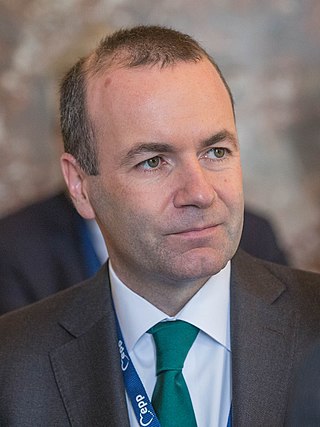
The 2019 European Parliament election was held between 23 and 26 May 2019, the ninth parliamentary election since the first direct elections in 1979. A total of 751 Members of the European Parliament (MEPs) represent more than 512 million people from 28 member states. In February 2018, the European Parliament had voted to decrease the number of MEPs from 751 to 705 if the United Kingdom were to withdraw from the European Union on 29 March 2019. However, the United Kingdom participated alongside other EU member states after an extension of Article 50 to 31 October 2019; therefore, the allocation of seats between the member states and the total number of seats remained as it had been in 2014. The Ninth European Parliament had its first plenary session on 2 July 2019.

Paulo Artur dos Santos Castro de Campos Rangel is a Portuguese jurist and politician of the Social Democratic Party (PSD) who has been Minister of Foreign Affairs since 2024, in the XXIV Constitutional Government, led by Luís Montenegro.

The Spitzenkandidat process is the method of linking the choice of President of the Commission to the outcome of the European Parliament elections, with each major European Political Party nominating their candidate for Commission President prior to the Parliamentary elections. The Spitzenkandidat of the largest party would then be proposed by the European Council to the European Parliament for election to the Commission Presidency.

The ninth European Parliament was elected during the 2019 elections and is slated to remain in session until the forthcoming 2024 elections.

Renew Europe (Renew) is a liberal, pro-European political group of the European Parliament founded for the ninth European Parliament term. The group is the successor to the Alliance of Liberals and Democrats for Europe (ALDE) group which existed during the sixth, seventh and eighth terms from 2004 to 2019, and under a variety of other names in earlier Parliaments. Renew Europe in the European Committee of the Regions is the sister group of Renew Europe.

The von der Leyen Commission is the current European Commission, in office since 1 December 2019 and is to last until the 2024 elections. It has Ursula von der Leyen as its president and it further consists of one commissioner from each of the member states of the European Union.
The European Parliament election is set to take place in June 2024. This article lists national polls for the European Union (EU) election as well as EU-wide seat projections and popular vote estimates.

